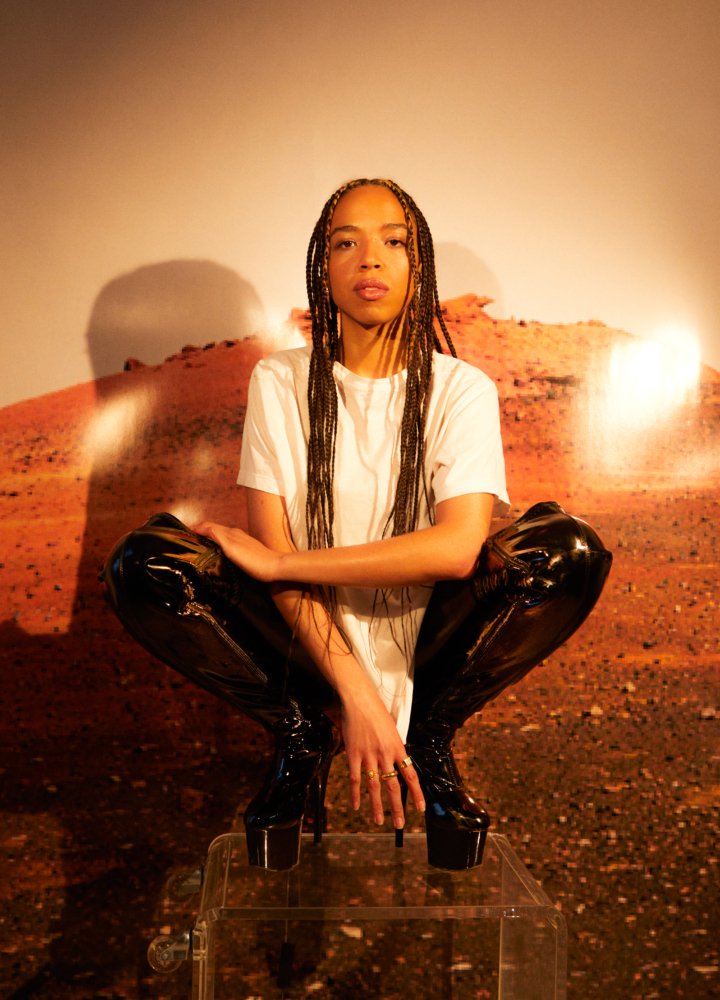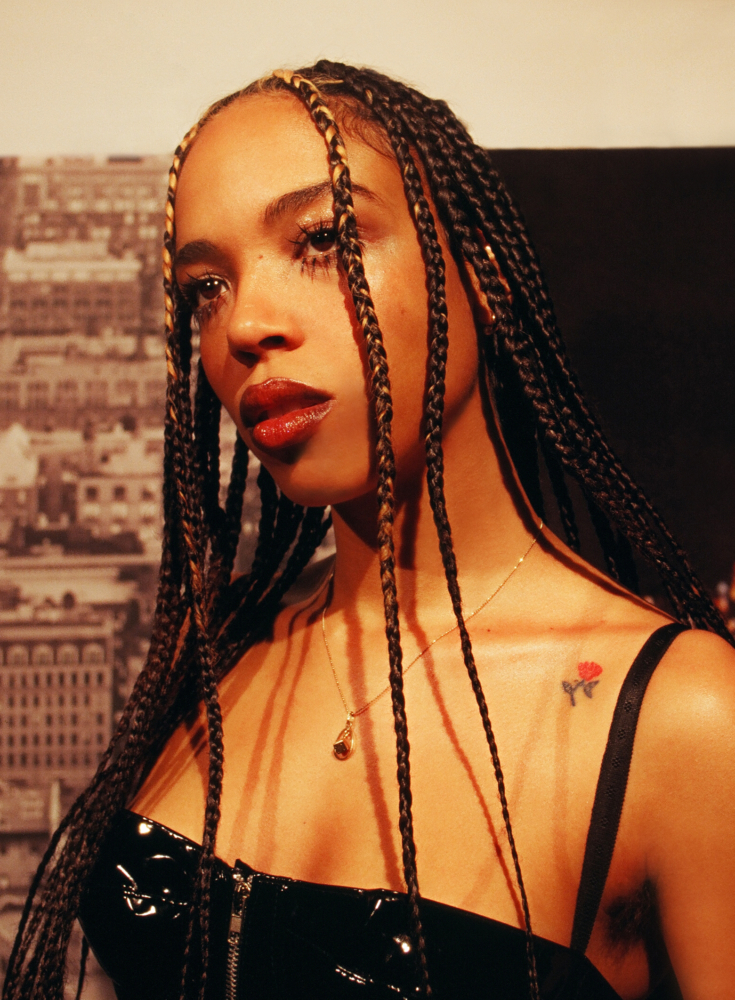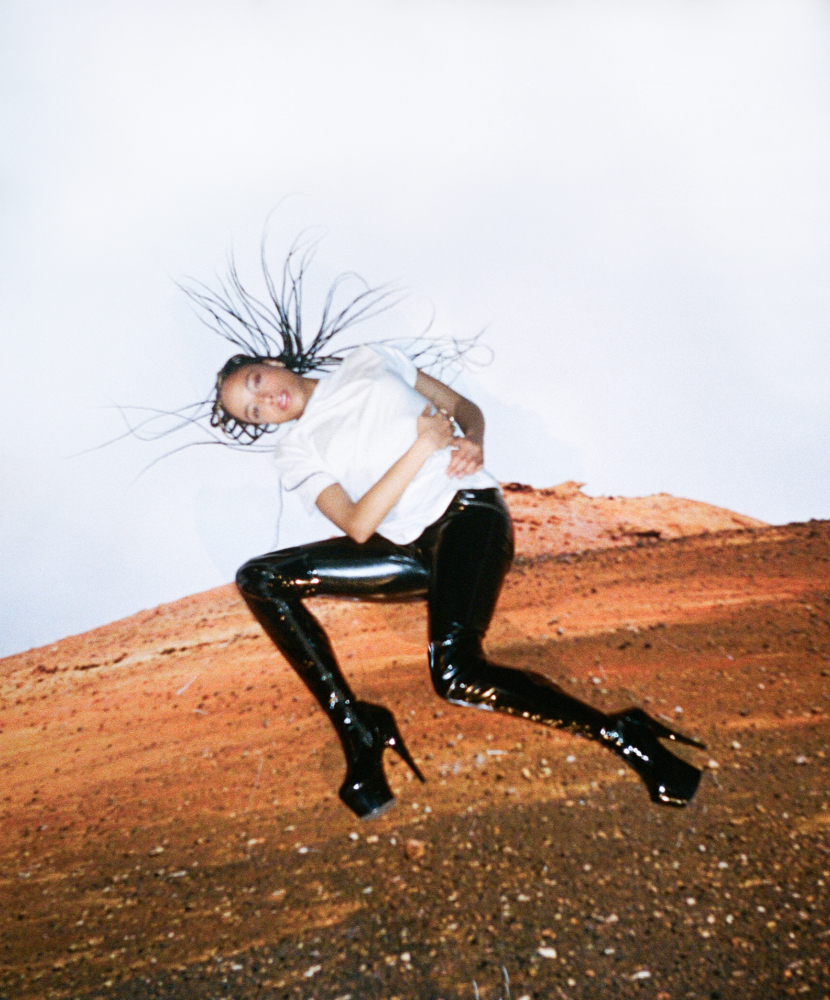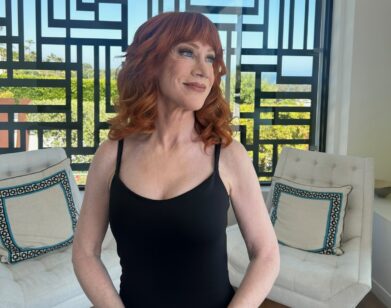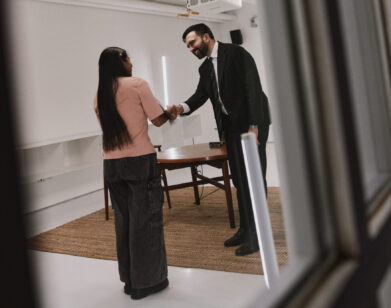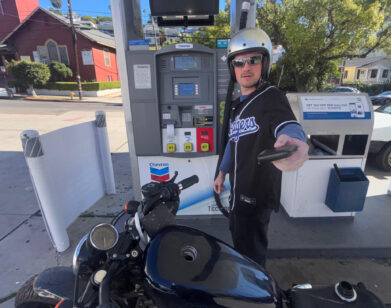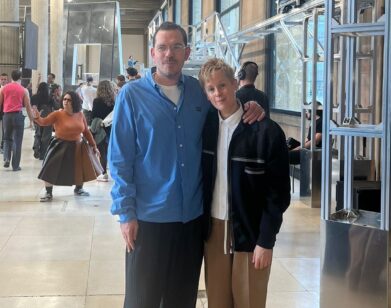Zsela Talks to Hunter Schafer About the Trick to Making Art in Quarantine
The post-millennial music landscape can feel like a tsunami, wave after wave of hitmakers in a constant state of crashing. TikTok stars, Bad Bhabies, and Soundcloud rappers become stars in the blink of an eye. But Zsela, the 25-year-old New York wunderkind , opted for a rather radical concept for her first EP, Ache of Victory. The singer-songwriter chose to be patient and developed her first body of work over a number of years, allowing the music, and her voice, to take shape, simmer, and eventually emerge as the eerie and soulful package that is her debut EP. It was worth the wait.
Zsela—neé Zsela Thompson, sister of the actor Tessa—decided to stick to her gut and release the EP mid-quarantine—which presents its own set of challenges—one of them being the lack of visuals to accompany it. But that didn’t stop her. The last track on the EP, “Undone,” is a siren-song about losing something, moving on, and the debris left behind from doing all that work. As it goes with quarantined creative minds, Zsela found a way to make a music video from home, with the help of her mother’s photography equipment, and a lot of free time. On a sunny California day, Zsela got on the phone with her friend, the model and actress Hunter Schafer, to discuss family board games, the fun in making music videos in quarantine, and Zoom church services. — ERNEST MACIAS
———
ZSELA: When did we first meet?
HUNTER SCHAFER: I feel like it must have been out. Was it in New York?
ZSELA: It was definitely out. Wait, was it at that weird party where we were on the roof?
SCHAFER: Oh, was it a fashion party thing?
ZSELA: I remember we didn’t want to be there, and we were hiding in the corner on the roof, escaping because it was so packed. It’s all a blur. How are you?
SCHAFER: I’m at home, just woke up an hour ago. How is quarantine right now?
ZSELA: Taking it day by day. It’s just weird, but right now I’m sitting in the backyard at my parents’ house in the sun and that feels crazy lucky. Where are you?
SCHAFER: I’m in my apartment in West Hollywood. I have a little access to the sun on my balcony, but I imagine you’re in grass. Grass sounds really nice. So you put an album out this month.
ZSELA: I did.
SCHAFER: It’s fucking amazing, first of all. Technically it’s your first one. How does it feel to release it out into the world, a full body of work?
ZSELA: It’s been so long in the making that it honestly feels really good to have this release in a physical sense, but also emotional sense. There’s something strange about releasing this now, but honestly, I found so much security in keeping the original release date. I just wanted to get it out, and if it’s healing for anyone, that’s sick.
SCHAFER: Was there a moment of feeling finished, when you knew you were ready to put it out?
ZSELA: I had to just fucking commit because otherwise, I’d just be messing with it forever. It’s been a labor of love because we’re working with such a small budget. Even the last song, “Undone,” I recorded in just a night because I wanted it to be on the EP so bad and didn’t want to waste time mastering it or tinkering with the sound.
SCHAFER: Wow. So that was one of the last songs you recorded?
ZSELA: That was one of the final touches, and I was like, “Okay, we should probably wrap this up before I’m like, “I can actually turn this into a full album,” and suddenly we’re recording five more songs.
SCHAFER: You’ve been working on this EP for a few years. One thing I’ve learned over the past year is that when you work on something so intensely for such a long time, you develop a really crazy relationship with the project. Then you put it into the world, and it’s such a strange processing moment, at least for me. How has seeing and hearing reactions been? Or do you even look at that kind of thing?
ZSELA: I definitely do. I look at the messages people leave me. I’ve been releasing singles over a year and a half, so it’s been cool to see how patient people have been with me—and to know that they’re still with me, and excited about this project. It’s been really special to hear people be like, “Worth the wait.”
SCHAFER: I think you reposted a story of someone dancing to one of the songs. Have you gotten a lot of those?
ZSELA: Oh my god that was so cute. Yes, a friend of mine does a drag show, and he performed to my song “Noise,” which was crazy.
SCHAFER: A drag show is not what I would expect for that song, but that’s magic.
ZSELA: Have you ever been to Hudson?
SCHAFER: No. I never went upstate for the whole year and a half that I lived in New York.
ZSELA: Wait, when did you live in New York?
SCHAFER: I went there right after high school. You’re in L.A. now, right?
ZSELA: I grew up in Brooklyn.
SCHAFER: Do you miss it right?
ZSELA: I do. It feels weird not to be there. But I also feel really thankful I can be close to my family right now. Where is your family?
SCHAFER: I miss my family a whole lot. They’re in North Carolina. I figured it’s not the best thing to try and go back right now, or leave the apartment at all. My family works in the church, so they had to start doing church on Zoom, which is a trip.
ZSELA: Wow. Do you attend?
SCHAFER: Fuck, I actually missed it yesterday. I wanted to tune in to one of the services.
ZSELA: I want to tune in.
SCHAFER: I’ll send you a link. I’ve only seen my dad preach from an actual preacher thing. It would be pretty wild to watch it on the computer. You released the first visual for the EP for “Undone,” right? Did you conceptualize that video? What was that process like?
ZSELA: Before everything hit with the pandemic, I was supposed to go to London because I had been wanting to work with this director for so long, and we had finally met and we were excited about this video. I was supposed to go to London to plot it out with him, but that all got canceled, obviously. When I came out here I was fine with not having visual for the EP. I figured I’d just let the music live on its own. But once I settled into my parents’ house I wanted to take advantage of the resources we have. My mom’s a photographer. She has all these cool studio lights and all kinds of equipment. Her friend Jasper Marsalis is in my family’s loop and he’s super talented. We were just joking around about making a video, he got super serious about it and just started writing out a storyboard, and suddenly we had this video.
“Undone” is about loss, and what it takes to move on, and what you lose from moving on. In the song, there’s this steady drone throughout. So, his idea was to have that drone take the form of the black fade in the video. It’s this recurring theme of emptiness. So, the three of us just banged it out in two days in my parents’s shed in the backyard. It was so nice because, for one second, we could take a breath from all the horrible news.
SCHAFER: Was your mom taking photos?
ZSELA: She was the assistant directing-lighting-art director. My brother was the PA. He was running around like, “We need water.” Then the three of us: me, my dad, and my mom, just sat on the computer and edited it all together. We had to be unanimous with every decision.
SCHAFER: It’s mind-blowing that you did this with just a few people in two days because it’s gorgeous. Do you think about visuals a lot when you’re making music, or does that feel more symptomatic?
ZSELA: Not so far. I’ve just been so invested in the songs and getting them right. But maybe that’ll change in the future.
SCHAFER: I guess that’s why a lot of musicians blow my mind. When I listen to a song or try to make music, which has been a disaster, the only way I can think about it is to see it. Or, I see what it would look like and then I try to figure out what that sounds like.
ZSELA: But you paint and stuff. That comes into play when you’re thinking about music, too. Sometimes I think in colors with music, but I’m not so visual. I’m very insecure about any sort of drawing and painting. I went to an alternative school, and we did a lot of our learning through art. You had to draw your textbooks, things like that. It had to be perfect, so that was a little school trauma of mine. Maybe during this quarantine I’ll start drawing again.
SCHAFER: Who are your biggest musical influences? Is there anything you consumed that directly influenced the album?
ZSELA: The EP, as you know, spanned a few years. I definitely went through a lot of different music. It’s hard to go back there, to remember what I was listening to.
SCHAFER: I think the last interview I did, I was asked to name some of my favorite movies, and I was just like, Teen Titans, Paris is Burning, and that’s all I got.
ZSELA: I was recently asked to recommend a book, and I literally couldn’t think of one book but the dictionary. I was like, “Don’t say dictionary. Don’t say a dictionary. Don’t say dictionary.” One influence of mine is Anohni. I grew up listening to that first album.
SCHAFER: I’m a massive Anohni fan.
ZSELA: You too? Oh my god. I also grew up loving Martha Wainwright.
SCHAFER: Which Anohni albums did you grow up listening to?
ZSELA: I Am a Bird Now. On repeat.
SCHAFER: That’s the magic. You could listen to anything she makes on loop. I also find that in your music, actually. Have any hobbies resurfaced during quarantine?
ZSELA: I love games. My family loves games too. We have a game night every week and my sister comes over. My brother made a ping-pong table on our dining room table and we have ping-pong tournaments. We set up badminton in the backyard.
SCHAFER: Whoa. These are sporty games. Are you thinking about what you want to do next, after all of this?
ZSELA: I’ve been working on ideas for my next project. I’m just excited to dig into that. I’m going to try and make another video since, you know, I have the crew here.

